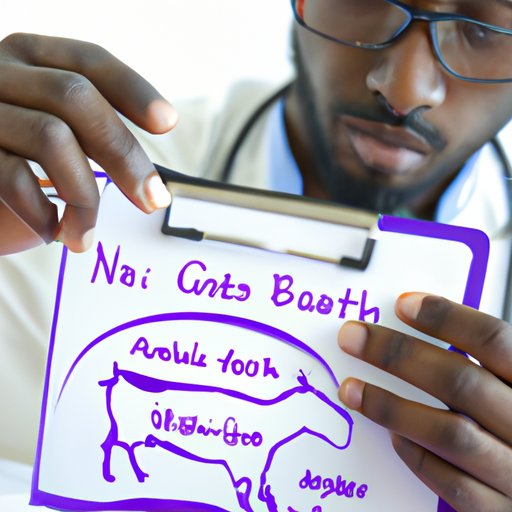Introduction
Goat meat, also known as chevon or cabrito, is a type of red meat that is becoming increasingly popular around the world. It is leaner than other red meats and is high in essential nutrients like iron and zinc. In this article, we will explore the nutritional benefits and risks of eating goat, and examine how it compares to other red meats. We will also look at the health benefits of goat milk, and provide some delicious recipes for cooking with goat.
Exploring the Nutritional Benefits of Eating Goat Meat
Goat meat is an excellent source of protein, with one 3-ounce serving providing almost 25 grams. It is also high in essential vitamins and minerals like iron, zinc, vitamin B12, and selenium. In addition, goat meat is low in fat and cholesterol, making it a healthier alternative to other red meats.
Goat meat is also rich in conjugated linoleic acid (CLA), which has been shown to have anti-inflammatory properties and may help reduce the risk of certain diseases. Additionally, goat meat contains high levels of omega-3 fatty acids, which are important for heart health and cognitive function.
How Does Eating Goat Compare to Other Red Meats?
When compared to beef and pork, goat meat has a significantly lower fat content. In fact, it has just 5 grams of fat per 3-ounce serving, while beef and pork contain up to 18 grams. Additionally, goat meat has higher levels of iron and zinc than other red meats, making it an excellent source of these essential nutrients.

Examining the Health Risks of Eating Goat
As with any type of meat, there are potential health risks associated with eating goat. The most common risk is infection from parasites such as tapeworms and roundworms, which can be found in undercooked goat meat. Additionally, there is a risk of food-borne illnesses such as salmonella if the meat is not cooked properly. To minimize the risk of infection, it is important to make sure that all goat meat is cooked to an internal temperature of 165°F (74°C).
Is Goat Milk a Healthy Alternative to Cow’s Milk?
Goat milk is becoming increasingly popular as an alternative to cow’s milk, and it has some notable nutritional advantages. It is higher in calcium, vitamin A, and potassium than cow’s milk, and it is also easier to digest due to its smaller fat globules. However, goat milk does contain allergens, so it is important to consult your doctor before consuming it if you have a sensitivity or allergy to dairy products.

Cooking with Goat: Healthy Recipes for Every Meal
Goat is a versatile ingredient that can be used in a variety of dishes. Popular recipes include curried goat, goat tacos, and goat stew. When cooking with goat, it is important to remember that it is a lean meat and can become tough if overcooked. To ensure a tender texture, it is best to cook the meat slowly over low heat. Additionally, it is important to season the meat well to enhance the flavor.
Conclusion
Goat meat is an excellent source of protein and essential vitamins and minerals, and is lower in fat and cholesterol than other red meats. While there are potential risks associated with eating undercooked goat meat, these can be minimized by following proper cooking practices. Goat milk is also a healthy alternative to cow’s milk, although those with dairy allergies should consult their doctor before consuming it. For those looking to incorporate goat into their diet, there are many delicious recipes available for every meal.
(Note: Is this article not meeting your expectations? Do you have knowledge or insights to share? Unlock new opportunities and expand your reach by joining our authors team. Click Registration to join us and share your expertise with our readers.)
